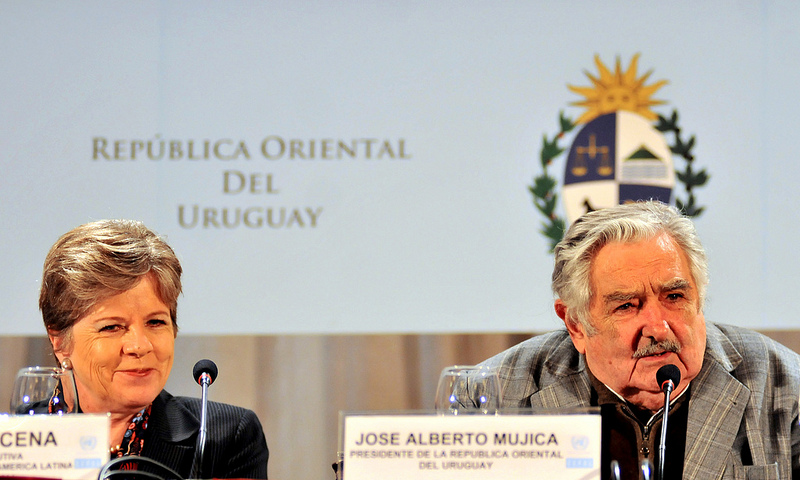First session of the Regional Conference on Population and Development Begins in Uruguay
Work area(s)
Representatives from over 30 Latin American and Caribbean countries will discuss priority issues for a future population agenda beyond 2014, at an event attended by over 800 people.

Watch live streaming of the Regional Conference
See photo gallery
Watch the video about the Regional Conference
(12 August 2013) The First session of the Regional Conference on Population and Development in Latin America and the Caribbean opened today in Montevideo, Uruguay, in the presence of representatives from over 30 Latin American and Caribbean countries, who will spend four days discussing a regional population and development agenda beyond 2014.
This is one of the largest intergovernmental meetings in recent years, welcoming over 800 people including authorities, senior international officials, population experts and representatives from non-governmental organizations. The meeting is being organized by the Economic Commission for Latin America and the Caribbean (ECLAC) in conjunction with the Government of Uruguay and with the support of the United Nations Population Fund (UNFPA).
The opening ceremony was presided over by the President of Uruguay, José Mujica, Uruguayan Foreign Affairs Minister, Luis Almagro, ECLAC Executive Secretary, Alicia Bárcena, Executive Director of UNFPA, Babatunde Osotimehin, and Ibero-American Secretary-General (SEGIB), Enrique V. Iglesias.
In his speech, Uruguayan President José Mujica welcomed participants on behalf of his country and stated that while the topics were not new, the circumstances of the world are new. He declared "We are living amidst a technical and scientific explosion, with a major accumulation of capital and constant pressures on demand. Ours is a volatile and tumultuous time".
According to President Mujica "There are now brutal globalizing forces and a kind of weak governance of civilization, of which we are victims and perpetrators. In this context, we have to ask ourselves: will our children be happier? And what is happiness? I do not have a clear answer, but freedom must come close. Yet there are smaller liberties: having time to live. I would therefore like to thank those contributing science, data and thoughts. Intellectual work is an attempt to further understanding".
In her opening address, ECLAC Executive Secretary, Alicia Bárcena, stated that the conference was a culmination of a long process to integrate the human rights approach into development policies. She said "The region is now in a better position than it was 20 years ago. We can now speak as one voice that combines the demands of all social groups that have made the ICPD and its regional plan of action part of their agenda. We have our own voice on the global scene".
According to Ms. Bárcena "Our agenda is based on equality, citizenship, deepening democracy, rights for all citizens, an agenda for everyone including women - all leading to a society of well-being and happiness".
The senior United Nations official stated that it was no coincidence that the first session of the Regional Conference is being held in Uruguay. She said "this country has played an innovative role in various population and development matters, such as setting up specific institutions involved in medium- and long-term planning, increasing social protection using equality-based mechanisms, branching out into gender- and generational-based care, fighting for tolerance and against racism and discrimination, enforcing sexual and reproductive rights and universal access to sexual and reproductive health".
According to the Executive Director of UNFPA, Babatunde Osotimehin, "Promoting gender equality in a post-2015 world includes finishing the work of the Millennium Declaration." "Unfortunately," he stressed, "the MDGs that are most off-track are those directly linked to achieving gender equality, such as reducing maternal death and ensuring universal reproductive health and rights. This is despite overwhelming evidence that gender inequality significantly slows economic growth in both rich and poor countries."
On growth, he stressed the essential role of another population group: young people, "Several countries are poised to reap the ‘demographic dividend', he said, adding, "but this requires that decision-makers and planners invest now in programmes to improve young people's access to decent work, education, social participation and health services, particularly sexual and reproductive health services. Fully engaged, educated, healthy and productive adolescents and youth can help break the cycle of poverty and strengthen their families, communities and nations. The outcome of this conference should send a clear message to the 140 million young people living in the region that we are listening to them and that we want to join forces to provide opportunities for those among their ranks who don't have access to school or work."
Ibero-American Secretary-General (SEGIB), Enrique V. Iglesias, highlighted the United Nations commitment to human rights and the common goods of humanity and the population. He said "I am proud to believe in the UN, and particularly this UN meeting. Uruguay is great because it is faithful to its human rights commitment, which is a great tradition in our country".
Lastly, Uruguay's Foreign Affairs Minister, Luis Almagro, reaffirmed the commitment of his country with the population agenda and highlighted the recently approved law that guarantees legal, safe and gratuite abortion.
See also:
The media are invited to cover the conference.
More information, including the meeting documents, are available on the ECLAC website here.
Watch the various meeting sessions from Montevideo live online on the ECLAC website.
Any press queries and interview requests should be sent to María Amparo Lasso, Chief of ECLAC's Public Information and Web Services Section. E-mail: mariaamparo.lasso@cepal.org, phone: (569) 79678306, or Félix Ibáñez, e-mail: felix.ibanez@cepal.org, phone: (569) 88390576, or Sonia González, e-mail: sonia.gonzalez@cepal.org, phone: (569) 88390795.
At UNFPA please contact Abubakar Dungus, Chief, Media and Cummunications Branch UNFPA. Phone + 164 62266120; e-mail: dungus@unfpa.org , or Alvaro Serrano, phone: +507 65618183, e-mail: serrano@unfpa.org .
Follow us on: Twitter, Facebook, Flickr and YouTube.
Country(ies)
- Latin America and the Caribbean
Contact
Public Information Unit
- prensa@cepal.org
- (56 2) 2210 2040
